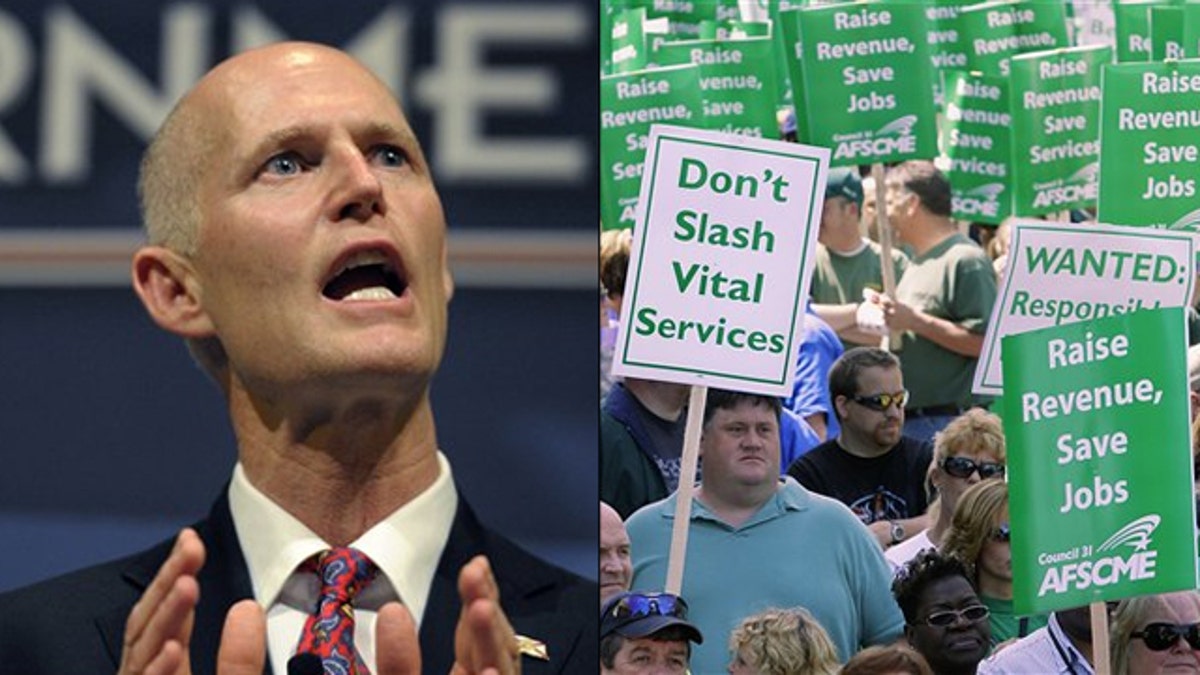
At left, Florida Gov. Rick Scott speaks at a Tea Party event in Eustis, Fla., Feb. 7. At right, Illinois state workers and union members rally in Springfield, Ill., to protest budget cuts in April 2010. (AP)
Lawmakers around the country are looking at new ways to prevent budget disasters by changing the rules for overburdened state employee pension funds. But they are meeting stiff resistance from public employee unions.
Two Arizona state lawmakers this week, including the speaker of the House, introduced their plan to salvage the state's budget by significantly changing the public retirement system.
Following the lead of Gov. Chris Christie, R-N.J., a pair of New Jersey assemblymen on Monday put forth their legislative solution to make solvent a fund that's $54 billion in the red.
Also on Monday, in his first budget address as governor, Florida's Rick Scott announced his effort to "stabilize and secure" government employee pensions.
The moves are part of a larger battle over pension reform between conservative budget hawks and government worker unions. And the public-sector employees are fighting back hard.
"We're working in partnership with affiliates around the country to wage full-scale battleground campaigns -- to defend our pensions, to fight budget cuts and privatization, to protect collective bargaining and our political power," said American Federation of State, County and Municipal Employees Secretary-Treasurer Lee Saunders at a public pension leadership meeting in Washington late last year.
Saunders's union, a vocal and powerful political force, often in support of Democrats, represents more than 1.6 million state, county and municipal workers who will be directly affected by the reforms proposed nationwide.
The fight for pension reform was certainly a political winner in 2010 for Wisconsin's Scott Walker and Ohio's John Kasich. The Republicans each championed the cause on the way to becoming governor of their respective states. On his first day in office, Kasich sent a letter to state employees explaining how "like any organization, state government has, over time, slowly become too bureaucratic. Together we'll recharge it, reform it, modernize it and, yes, in some cases, make it smaller."
Ron Snell, who keeps track of pension legislation for the National Conference of State Legislatures, said lawmakers are motivated by a double squeeze on pension systems -- the investment market collapse of 2008 and a glut of retirements as Baby Boomers move into their 60's.
The economic difficulty of finding solutions to balance the ledger is matched by the hard political effort that will be needed to take away or curtail benefits for state union employees. Lawmakers who support such plans risk the label of "anti-worker politician" from labor leaders like AFSCME President Gerry McEntee -- a sobriquet often matched with big campaign spending.
"I think what you were hearing from President McEntee was a very legitimate concern that the problems that public employee pensions are facing because of the economic downturn are really being exploited by some politicians who want to use this as an opportunity to attack working families in this country," Scott Wasserman, political director of Colorado WINS, which represents public employees, told Fox News.
Wasserman also attended the December union summit and says states can look to what Colorado accomplished in 2010 as a model for success. "I think there was universal recognition on both sides of the aisle that this was an important problem to fix, " Wasserman said. "And that if we all work together and if there was shared sacrifice from employees and from taxpayers and from retirees that we could actually put out fund on the track to solvency."
Colorado lawmakers passed a plan that increased the employee contribution rate while the state share of retirement contributions decreased. The deal also increased age and service requirements especially for younger and future state workers.
But not everyone in Colorado thinks the deal is a swell compromise. Approximately 100,000 retirees are asking a state court to invalidate the law claiming that another part of the plan illegally lowers future cost of living adjustments.
In Florida, Scott said the hard decisions that have been made in the private sector must be made in his state. He's asking workers to contribute 5 percent of their income toward the retirement fund.
"We cannot ask Florida taxpayers, most of whom have no pension at all, to bear all the costs of pensions for government employees," Scott said. "By modernizing the Florida Retirement System, we will save taxpayers $2.8 billion over two years."
Even if states are able to solve the political problems with employee pensions and pass reform legislation, the actual economic benefit from their hard work will not be readily seen.
"Over time, the systems will cost the public substantially less. It won't show up quickly, but it will certainly take care of the problem in the long run," Snell said.




